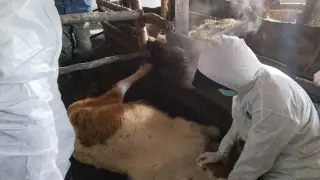Tengrinews.kz - For over two years, authorities in Karaganda Region have been struggling to control a dangerous infectious disease affecting horses.
Due to African glanders in three villages of the Bukhar-Zhyrau District, more than 350 horses have been culled. However, their owners claim that the number of infected animals is not decreasing.
African glanders, also known as epizootic lymphangitis, was first reported in the village of Umitker in the spring of 2023. Quarantine measures were imposed in May, and in February 2024, restrictions were extended to two more villages – Tortkol and Ulgi. Since then, 362 horses have been seized and culled from 182 households in the Umitker Rural District.
"We are losing our horses en masse, animals we raised for years. It starts with pustules on their skin that affect the lymph nodes. The animals suffer greatly; the abscesses grow and emit a foul smell. We don’t know how to help them," residents shared.
Madeniyet Zhumadilda, a resident of Tortkol, said the disease claimed 20 of his horses. He tried to save them by purchasing medicines and vaccinating and revaccinating his herd, but the treatment yielded no results.
"They are refusing to pay us compensation under various pretexts, trying to argue that the horses aren't dying from lymphangitis. There was even a case where an examination in Otar confirmed lymphangitis, but in Karaganda, it was denied—apparently to avoid payouts. It feels like they’re giving money out of their own pockets. Additionally, quarantine measures were poorly organized from the start. If they had immediately restricted access for sick horses from Umitker to shared pastures, the scale of the infection wouldn’t have been this large. Now, the quarantine could go on indefinitely," said Madeniyet Zhumadilda.
His brother, Kadirolla Zhumadilda, claimed to have lost 12 horses to lymphangitis. He criticized the veterinary control specialists for their slow response.
"When a horse falls ill, you inform them, but they come 10 to 15 days later. They don’t take all the sick animals, presumably to avoid paying compensation, even though the symptoms are clear," added Kadirolla Zhumadilda.
According to the Karaganda Regional Territorial Inspection of the Committee for Veterinary Control and Supervision, specialists from the regional branch of the Republican Anti-Epizootic Squad are working in the quarantine zone. They inspect large herds of horses every five days and isolate animals with clinical symptoms of the disease. Officially, disinfection of stables is conducted every fifteen days.
"Epizootic lymphangitis is a dangerous infectious disease in horses that can persist for up to two years. Previously, there was no vaccine for it. In 2023–2024, specialists from the Institute of Biological Safety tested a new drug on 170 horses in the Umitker area, and no clinical symptoms were detected. On November 7, 2024, the vaccine successfully passed testing and was registered. A mass vaccination campaign for horses is now planned," reported Darkhan Imanbayev, head of the Biological Safety Department of the Karaganda Regional Territorial Inspection of the Veterinary Control and Supervision Committee.
The spokesperson noted that residents of quarantined villages have been informed of restrictions on the sale and transport of horses, horse meat, and kumis.
"The meat of infected horses is unsuitable for consumption, which has been communicated to the villagers. It can be identified by its purulent, ulcerative odor and appearance. Compensation for the seized animals is paid from the republican budget: out of 362 horses, payments have been made for 339. Documents for 14 have been submitted, and 9 are in the process of being finalized. It has also been noted that some owners are attempting to register other sick horses as cases of lymphangitis to claim compensation," the inspection reported.

